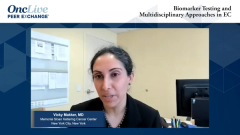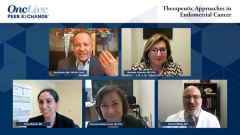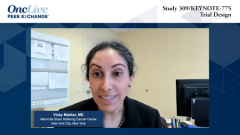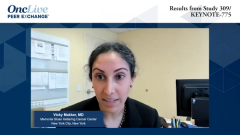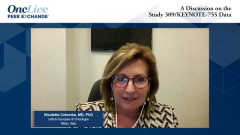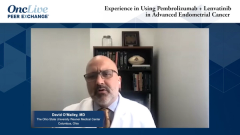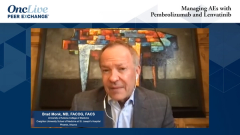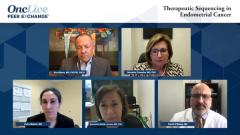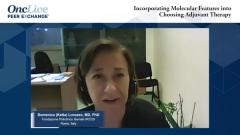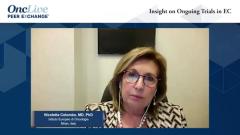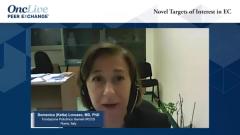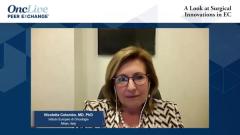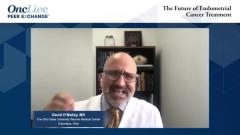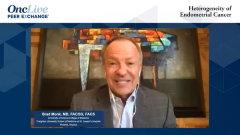
Therapeutic Sequencing in Endometrial Cancer
Experts in endometrial cancer comment on therapeutic sequencing in endometrial cancer.
Episodes in this series

Brad Monk, MD, FACOG, FACS: Let’s talk about sequencing. It’s clear that carboplatin-paclitaxel is the frontline therapy. Maybe LEAP-001 will show that pembrolizumab-lenvatinib is a better option, but for now that’s where we are. What I’m seeing people say is that pembrolizumab and lenvatinib have these associated adverse reactions; this place has a platinum-sensitive endometrial cancer recurrence. I’m going to change the sequencing, and I’m not going to use pembrolizumab-lenvatinib as a second line treatment. I’m going to give the patient another round, not of doxorubicin or paclitaxel—this was done in Study 309/KEYNOTE-775—but I’m going to re-treat them with carboplatin-paclitaxel, particularly in the adjuvant setting. Now they have recurrence. Is there any rationale, Nicoletta, to have a platinum-sensitive recurrent endometrial cancer and re-treat with platinum? Or is that just an inappropriate extrapolation from treating ovarian cancer?
Nicoletta Colombo, MD, PhD: I do believe that platinum and Taxol [paclitaxel] are effective drugs in endometrial cancer, so I don’t think they should be definitely abandoned. In terms of rechallenging, we don’t have specific trials for endometrial cancer setting the cutoff for the treatment or platinum sensitivity. We frequently use the experience treating ovarian cancer to treat endometrial cancer. However, the results of rechallenging with platinum in endometrial cancer are a little less brilliant compared with ovarian cancer. Therefore, there is definitely space and a need for improvement in this setting. For patients with deficient mismatch repair, it is easier. If you have a recurrence and the patient receives adjuvant treatment, I would go for I/O [immuno-oncology] very easily before using chemotherapy. It’s more difficult and challenging for the patients with proficient-repair endometrial cancer in this metric, not MSI [microsatellite instability]–high cases. Here, I would use a lot of clinical judgment. For instance, if you perceived that the patient had the benefit from adjuvant treatment because she has a long disease-free interval—she was high risk, but she has a very longer disease-free interval—I would probably use a platinum to start with. I would keep the new combination for later on because, as we have heard, this is a very attractive combination, a very effective combination, but of course there’s toxicity. Therefore, it’s not that we doubt that platinum is without toxicity, but we’re used to this platinum and toxicity, so whenever you believe that this may be effective, I would probably try this drug first and then go to the combination or the new combination.
Brad Monk, MD, FACOG, FACS: Ketta, in the TP53-mutated subgroup that you nicely outlined, which are frequently cirrus under the microscope—although not universally—does that influence that decision of sequencing? Or are you going to do what Nicoletta suggested, which is basically use this as a second line as long as it’s not MSI-high? I’m probably going to go to pembrolizumab and lenvatinib.
Domenica Lorusso, MD, PhD: According to the subgroup analysis of the PORTEC-3 trial, for sure, but the clear impression is that TP53 tumors gained more benefit from chemotherapy. These are the data we have now and possibly in the future, this tumor will be treated with more than chemotherapy. Some very interesting ongoing trials suggest that these patients may also derive benefits from PARP inhibitor maintenance, and we have some trials addressing these issues. Based on the data we have—particularly in the setting that Nicoletta reported—for patients who have received only adjuvant treatment with a long remission, I would go with chemotherapy.
Brad Monk, MD, FACOG, FACS: Thank you.
David O’Malley, MD: I have to call the group out here. There is 0 data that supports re-treatment after prior exposure. If it would have worked, the patient would have been cured of their disease. For stage I serous cancer of the uterus, you wouldn’t have given them chemotherapy. We cure 90%-plus of those patients. It would have worked. You wouldn’t have a recurrence. We need to challenge this dogma. We have extrapolated information from ovarian cancer. There are little to no data to support re-treatment with the carboplatin-paclitaxel. Vicky, you told us 30% of patients had an overall response rate. When we look at those who had tumor shrinkage, we’re talking about two-thirds of patients. I see more of that data. When you really looking at this—I challenged this dogma myself—for that patient who has high-volume disease, response rates with pembrolizumab and lenvatinib are pretty good. I want to question us on this, and I don’t think we should continue with this dogma. We need to research it further.
Brad Monk, MD, FACOG, FACS: Do you want to rebut that? Then Vicky, I have 1 question. And then we’ll wrap it up. Go ahead if you want to make a comment.
Nicoletta Colombo, MD, PhD: We have a trial ongoing. The LEAP-001 trial will answer those questions. It’s just matter of time. We’ll see. Of course, maybe it is a stupid dogma, yet we do see a response also with chemotherapy when you rechallenge them. It’s not that they don’t respond. They respond with both regimens, so let’s wait for the LEAP-001 trial, and then we’ll have the answer.
Brad Monk, MD, FACOG, FACS: Go ahead. Any comments?
Domenica Lorusso, MD, PhD: I have a short comment. We have retrospective data suggesting there’s a rule for rechallenging with platinum. Following the European guidelines, we introduced this hypothesis. I agree with you, David, that this hypothesis was mainly based on the absence of an alternative, because when the clinician has more therapeutic alternatives, they can do more. Ten years ago, if we had all the alternatives we’re facing today, we would not request to rechallenge with the drug. But during the time we have no alternative, we have the opportunity to reintroduce and see a response to platinum. In the near future, we’ll have more data, and we’ll be able to answer more accurately what the appropriate sequences and algorithms are.
Brad Monk, MD, FACOG, FACS: Very diplomatic. I love that. Vicky—and also those of you who are involved in this trial—you’ve been very careful not to provide confidential information. I respect that, but we all want to know when the drug will be available, particularly in Europe, where it’s not available. Quite frankly, we also want to know when it will be FDA approved because the marketing will change. You can’t really market the data, or promote it, until it’s FDA approved. The press release was in December. Generally it takes 10 to 11 months, so that would be October to November for FDA approval? Is that a reasonable assumption?
Vicky Makker, MD: That’s a very reasonable assumption. Everybody involved is trying to proceed as diligently as possible. That’s what I can say to that. Can I just make 1 point, though, about the chemotherapy rechallenge question? I actually agree. There is no 1 size that fits all. The pembrolizumab data are very compelling. The efficacy is profound, and it is a robust regimen, but we have to consider the patient who is sitting in front of us. The truth is that not everybody will be robust enough to receive pembrolizumab and lenvatinib. Those patients may benefit from chemotherapy platinum-based free challenges. Of course, we must consider the patients who have the lower-grade endometrial adenocarcinomas. We didn’t talk about hormonal therapy, but obviously that’s also on the table for some of our patients.
TRANSCRIPT EDITED FOR CLARITY


